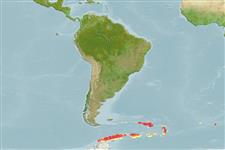Common names from other countries
Environment: milieu / climate zone / depth range / distribution range
Ecología
marino demersal; rango de profundidad 5 - 770 m. Polar; 53°S - 65°S, 67°W - 4°E
Southern Ocean: in the vicinity of Bouvet Island, Scotia Sea, and northern part of the Antarctic Peninsula.
Length at first maturity / Tamaño / Peso / Age
Maturity: Lm 44.9 range ? - ? cm
Max length : 72.0 cm TL macho / no sexado; (Ref. 4883); common length : 50.0 cm TL macho / no sexado; (Ref. 2805); peso máximo publicado: 3.7 kg (Ref. 4883)
Adults feed mostly on fish and krill. Synchronous spawner (Ref. 50743). Larvae have a long pelagic phase (Ref. 71843). Utilized as a food fish (Ref. 4931).
There is only one generation of oocytes in the ovaries indicative of determinate fecundity (Ref. 50743). Mature females may spawn for the first time from around 6-8 years of age (Ref. 71843).
Hureau, J.-C., 1985. Channichthyidae. p. 261-277. In W. Fischer and J.C. Hureau (eds.) FAO species identification sheets for fishery purposes. Southern Ocean (Fishing areas 48, 58 and 88). Rome. Vol. 2. (Ref. 2805)
IUCN Red List Status (Ref. 130435)
CITES (Ref. 128078)
Not Evaluated
Threat to humans
Harmless
Human uses
Pesquerías: escaso valor comercial
Herramientas
Special reports
Download XML
Fuentes de Internet
Estimates based on models
Preferred temperature (Ref.
115969): -1.3 - 1.6, mean 0 (based on 42 cells).
Phylogenetic diversity index (Ref.
82804): PD
50 = 1.0000 [Uniqueness, from 0.5 = low to 2.0 = high].
Bayesian length-weight: a=0.00091 (0.00077 - 0.00107), b=3.49 (3.44 - 3.54), in cm Total Length, based on LWR estimates for this species (Ref.
93245).
Nivel trófico (Ref.
69278): 3.4 ±0.2 se; based on diet studies.
Resiliencia (Ref.
120179): Medio, población duplicada en un tiempo mínimo de 1.4-4.4 años (K=0.17-0.24; Fec = 7,358).
Fishing Vulnerability (Ref.
59153): Moderate to high vulnerability (54 of 100).
Climate Vulnerability (Ref.
125649): High to very high vulnerability (75 of 100).
